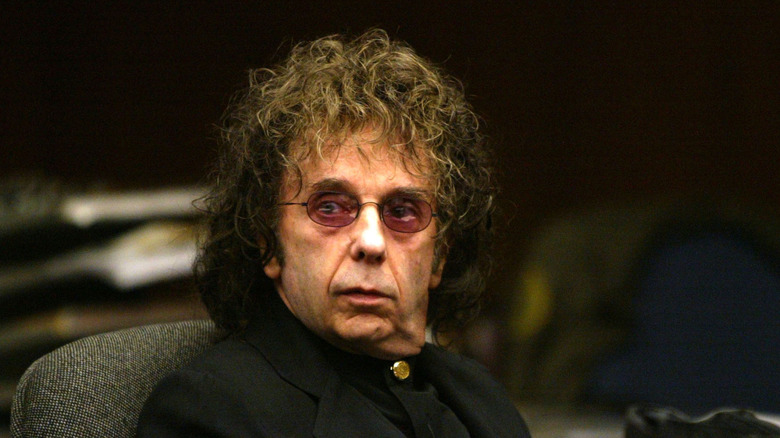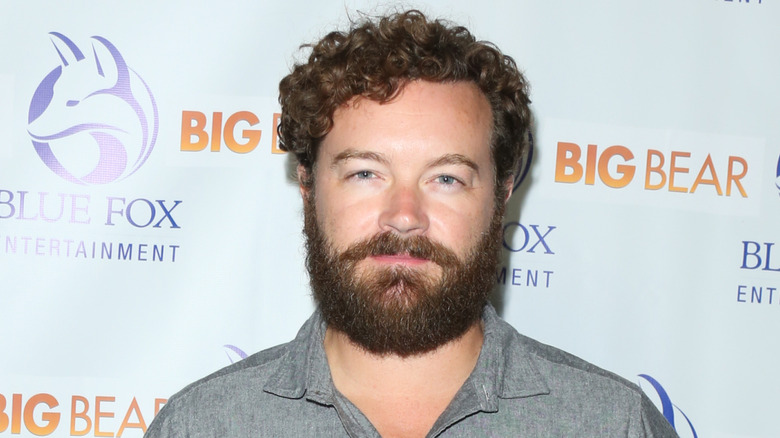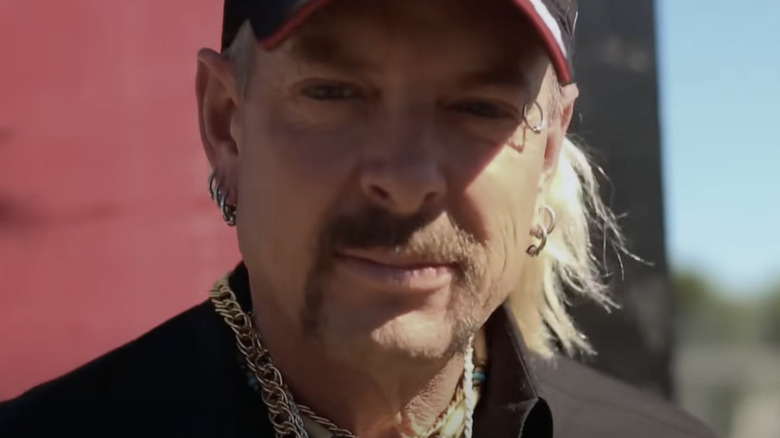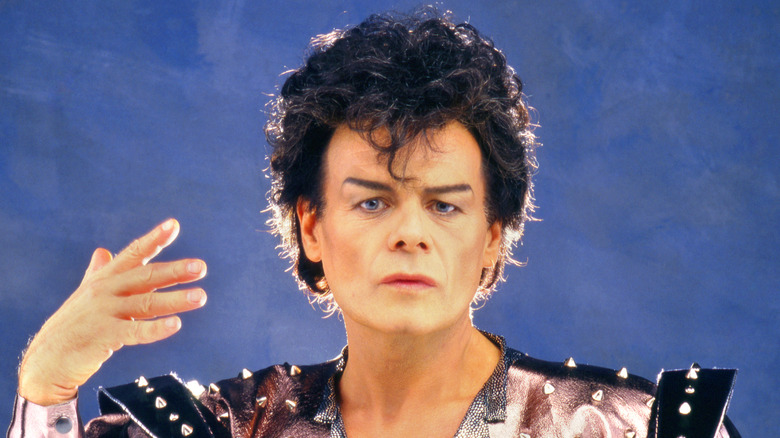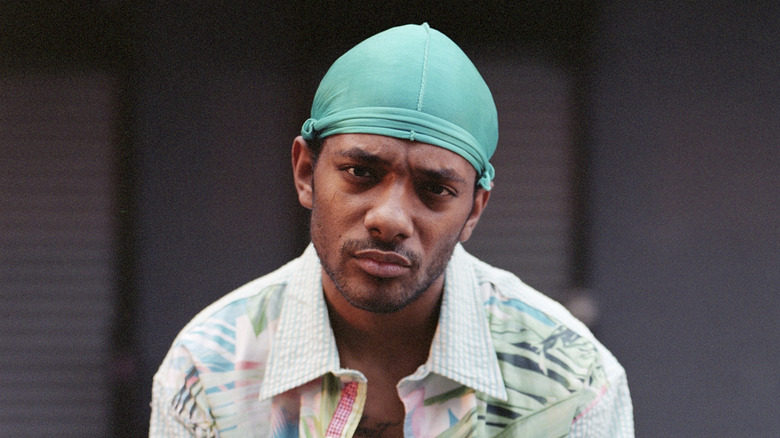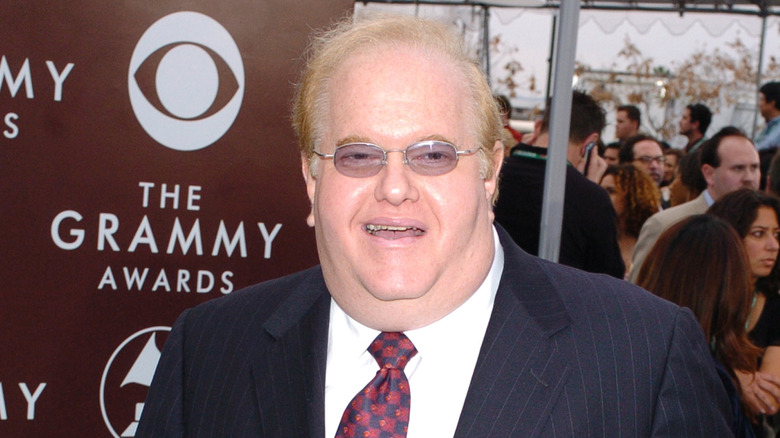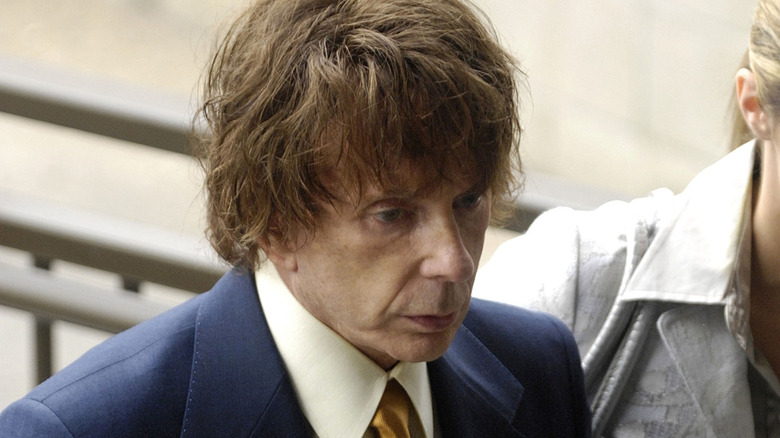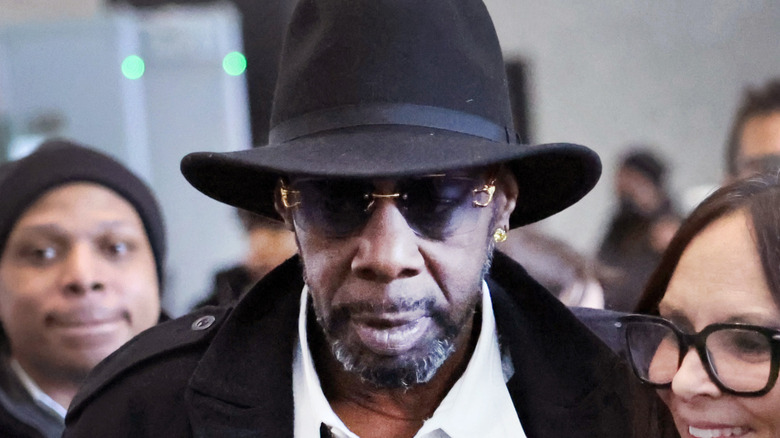Celebrities Whose Prison Lives Were Worse Than You Thought
For a successful actor or musician, life as a famous person is undeniably sweet. And it remains luxurious and awesome just as long as they don't do anything so bad that it leads to being locked up in an imposing facility for years on end. There are many celebrities who are still in prison years after a career-ending scandal or the commission of a horrific crime that resulted in their arrest, trial, and sentencing. Living largely out of the public eye, they do so without the cushy trappings of fame and fortune. Ever since they donned those orange jumpsuits and headed behind bars for a lengthy period of time to pay back their debt to society, those people who once graced movie and TV screens or the music charts now live a mundane schedule interrupted only by medical problems, annoyances, violent attacks, and other examples of the worst parts of being a human. Except that these folks all do it behind bars.
Here are some famous folks of all kinds who are also famously in prison, and whose lives as inmates in state or federal prison systems are dark, twisted, unpleasant, or terrifying.
The following article includes allegations of domestic abuse, child abuse, and sexual assault.
Danny Masterson
In 2023, actor Danny Masterson was sentenced to 30 years to life in prison, having been found guilty of two early 2000s sexual assaults. He spent his first few weeks behind bars in a downtown Los Angeles facility before a transfer to North Kern State Prison. With the actor's safety behind bars an immediate issue, he was sent to Corcoran State Prison, a highly secure facility that once housed Charles Manson as he avoided execution.
In February 2024, he was transferred again, to the lower-security California Men's Colony in San Luis Obispo, California. Therein, Masterson went to work for the guards as an office assistant. "He hands out 'ducats' or permission slips to fellow inmates who have medical appointments, counseling sessions, and other appointments within the prison," a source close to the situation told In Touch (via Y! Entertainment).
Following a daily pickleball workout of about two hours, Masterson reports to his cell for a 3 p.m. check-in, then uses a prison-owned tablet computer to play a game or watch a show from a limited selection. He can also use the tablet to send emails, but not use the internet, and everything he does is watched and logged. After that, Masterson heads to dinner in a cafeteria that serves poorly reviewed food. "He may have a casserole kind of thing that's so horrible most guys won't even eat it," the source said. "He will get a grilled chicken and a salad but it's mostly, like wilted lettuce."
Joe Exotic
Joe Exotic, a colorful, outspoken, self-made media star who for years ran a roadside wild cat park in Oklahoma, became a household name with the release of the 2020 Netflix documentary series "Tiger King: Murder, Mayhem, and Madness." As the show unfolded, it became evident that Joe Exotic may have committed a number of crimes, and the show debuted just after the zookeeper, under his legal name of Joseph Maldonado-Passage, began serving what would amount to a more than 20-year prison term. Maldonado-Passage was convicted on nine violations of the Endangered Species Act, eight acts of falsifying wildlife records, and two charges of murder for hire after he reportedly tried to arrange a contract killing of his animal world and "Tiger King" nemesis, Carole Baskin.
"I've been through hell in the last five years," Maldonado-Passage told TMZ in 2023 (via People). In 2020, he says, eight guards at Grady County Jail in Oklahoma executed a coordinated attack on him. "Tied me to a chair b*** naked, put me in a shower so long that I blacked out and I woke up with skin off my arms from the straps," he told the podcast "Lauren Interviews" (via TMZ).
Maldonado-Passage added that he's been diagnosed with prostate cancer, and that it had moved into the bladder, and later his lungs. "I went from 209 pounds down to 171 in the last three months," he told Newsweek in January 2025. "I'm not going to live to carry out this sentence."
Gary Glitter
Back in the 1970s, Gary Glitter epitomized the British glam sound. He became a superstar with glitzy stage looks and stomping rockers like "I'm the Leader of the Gang," and "Rock and Roll (Part 2)," better known as that "Hey!" song that used to be a ubiquitous crowd-pumping anthem at sports stadiums. Since the late '90s, Glitter has been in and out of prisons in the U.K. and Vietnam for a series of crimes involving children. The musician is likely stuck in prison for life, after he was denied parole in 2025 when he was found using the dark web to access highly illegal and sexually explicit images.
The U.K.'s Ministry of Justice won't readily report where Glitter (real name: Paul Gadd) is incarcerated, but it's been reported that he's housed in a special wing for vulnerable inmates at HMP Channings Wood. Cells are single occupancy only, and equipped with little more than a tea kettle, a radio, and a TV that gets only broadcast channels. Glitter spends most of his time within those four walls because, as a sex offender, he's kept away from the general population; lockdowns are frequent due to common outbreaks of violence among the inmates.
C-Murder
In the late '90s and early 2000s, the New Orleans sound, as presented by the acts on No Limit Records, made a big impact on hip-hop. Along with label founder Master P, the label's biggest success was the rapper's brother C-Murder, who sold millions of copies of his albums "Life and Death" and "Bossalinie." However, C-Murder hasn't made much music since the early 2000s, on account of his legal issues. When a fight broke out at the Platinum Club nightclub outside of New Orleans in January 2002, C-Murder shot and killed 16-year-old Steve Thomas. A jury convicted C-Murder of second-degree murder, and he started serving a life sentence in 2009.
While living out his sentence at the Elayn Hunt Correctional Center in Louisiana in 2021, C-Murder, or Corey Miller, was forced to bunk in an area with inmates who had tested positive for COVID-19. That, along with staff failing to heed masking and vaccination requirements, led to more prisoners contracting COVID-19 and higher quarantine times, according to Miller's family, who issued a complaint in the form of a press release. As a form of protest, C-Murder went on a hunger strike.
Ian Watkins
Welsh act Lostprophets was all over alternative rock radio in the early 2000s, with hits like "I Don't Know" and "Last Train Home." The band's frontman Ian Watkins became a big rock star with lots of devoted fans, and his exploitation of some of them allowed him to commit acts that "plunged into new depths of depravity," in the words of Justice Royce of the Cardiff Crown Court (via the BBC). In 2013, Watkins entered a guilty plea to 13 sexual offense charges, all against young children whose mothers were fans of Lostprophets and gave the musician permission and access. Citing a lack of remorse for what he'd done, Judge Royce sentenced Watkins to a sentence of 35 years in prison.
While incarcerated at HMP Wakefield in England in 2023, Watkins sustained an attack so severe that he was briefly hospitalized, causing an investigation by local police. Three inmates at the facility held Watkins against his will and then proceeded to seriously beat him and stab him on the side of his body, using a weapon made from a sharpened toilet brush. Watkins evidently owed someone in the group an unpaid drug charge of £900 (worth $1,150 at the time), and the assault took place despite the singer paying other prisoners the equivalent of thousands of dollars for protection services.
Prodigy
The bleak, violent, and compelling darker East Coast rap of the 1990s was pioneered by the duo Mobb Deep. Members Havoc and Prodigy (born Albert Johnson) released eight albums that included genre-classic songs like "Shook Ones (Part II)" and "Quiet Storm." One of several rappers with bizarre deaths, Prodigy's death at age 42 came in 2017, when he choked on an egg while under emergency care in a Las Vegas hospital for sickle cell anemia, a painful and debilitating condition he'd had since infancy.
Years before his tragic death, Prodigy's career was interrupted in the late 2000s with a three-year stint in New York's Rikers Island prison on a weapons charge, where he didn't get a lot of help facing the challenges of living with sickle cell anemia. On his first day of incarceration, he was diagnosed with food poisoning, which was such a shock that he endeavored to stay healthy and treat his sickle cell anemia with as good a diet as he could manage. Prodigy concocted a whole series of recipes, later published as "Commissary Kitchen: My Infamous Prison Cookbook." The rapper collected prison cafeteria and commissary items to make things like sweet potato pie, assembled from canned yams on a crust of butter, sugar, honey packets, and graham crackers.
Lou Pearlman
The boy band era of the late 1990s and early 2000s, which fueled MTV's popular "TRL" until it disappeared, was orchestrated in large part by Lou Pearlman. He put together and managed most of that genre's groups, including the Backstreet Boys, NSYNC, LFO, and O-Town, although he paid his musicians very little and siphoned the substantial profits for himself. Pearlman also operated a Ponzi scheme out of Florida, bilking around 2,000 investors and defrauding banks out of $300 million after persuading them to pour their money into two small airline businesses that didn't really exist. For his various convictions on financial fraud charges, Pearlman was sentenced to 25 years in prison in 2008.
While incarcerated, Pearlman navigated the federal prison system's medical system with a host of serious health issues. The former mogul endured a stroke in 2010, then in 2016 underwent a surgical procedure to correct a poorly functioning heart valve. Pearlman experienced further complications in the form of an infection of the heart's inner lining. That, in turn, led to a heart attack, which killed Pearlman at age 62.
Phil Spector
Regarded as a legendary star who was actually horrible, Phil Spector crafted the sound of the '60s with his "Wall of Sound" production techniques. Spector was also quite feared: He abused and imprisoned his wife, singer Ronnie Spector, threatened to kill members of the Ramones during a recording session, and in 2009, he was found guilty of second-degree murder for killing actor Lana Clarkson at his Los Angeles home six years prior. Spector was sentenced to 19 years to life, and he resided at the Corcoran State Prison in California, dying in 2021 after a transfer to the California Health Care Facility in Stockton. The violence that was so present in Spector's life followed him to prison, although he would be on the receiving end instead.
In 2009, Spector wrote to his friend, music writer Steven Escobar, who revealed that Spector lived in fear of a violent attack and that he couldn't bear to socialize in any way with the other inmates. Escobar said that Spector wanted "to get a better prison with people more like myself in it during the appeal process instead of all these lowlife scumbags, gangsters, and Manson types," he wrote (via CBS News).
Indeed, Spector was purportedly assaulted by another prisoner in 2010. After uttering a misinterpreted joke to another prisoner while in the yard, he suffered retaliation that left him with bruises on his nose, a black eye, and two dental caps knocked out of his mouth.
R. Kelly
R. Kelly truly was "The King of R&B" in the 1990s, notching dozens of hits like "Sex Me" and "Bump n' Grind." However, for almost his entire period as a celebrity, Kelly has pushed back on allegations of impropriety, exploitation, and abuse of women. He illegally married Aaliyah when she was 15 years old, evaded prison after being charged on multiple counts of creating sexually explicit content involving women not yet 18, and in 2017 was arrested, charged, and tried for leading a cultish group consisting of women he essentially kept prisoner at his home. In 2023, after being convicted of racketeering, sex trafficking, and various crimes against minors, Kelly was issued a 30-year sentence.
In 2020, while incarcerated at the Metropolitan Correctional Center in Chicago prior to his sentencing, Kelly was lying in his cell bed when he was attacked by another inmate. After being kicked, punched, and stomped upon, Kelly was also hit with pepper spray by a guard seeking to break up the incident. The assault reportedly left Kelly with anxiety, insomnia, and a fear of leaving his cell.
In 2025, after he was sent to solitary confinement at his North Carolina facility, prison staff administered Kelly his prescribed sleep and anti-anxiety medications, after which he went unconscious and was hospitalized. He was also treated for a severely swollen leg, the result of being denied blood thinners by guards, he argued. A scan showed blood clots in Kelly's legs and lungs, but before he could undergo a scheduled surgery, officials returned the musician to prison.
If you or anyone you know may be the victim of child abuse, is dealing with domestic abuse, or has been a victim of sexual assault, contact the relevant resources below:
-
The Childhelp National Child Abuse Hotline at 1-800-4-A-Child (1-800-422-4453) or contact their live chat services.
-
The National Domestic Violence Hotline at 1−800−799−7233. You can also find more information, resources, and support at their website.
-
The Rape, Abuse & Incest National Network website or contact RAINN's National Helpline at 1-800-656-HOPE (4673).
